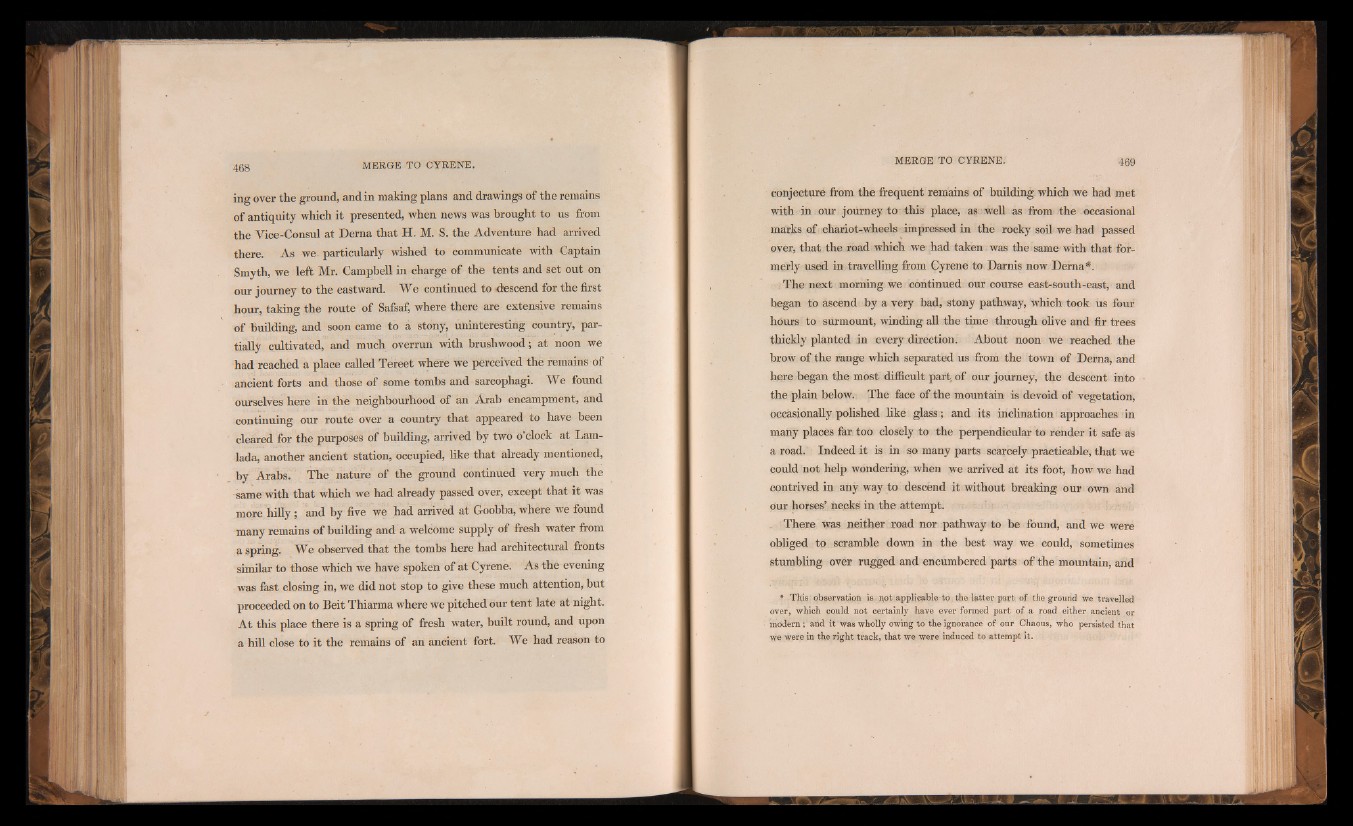
ing over the ground, and in making plans and drawings of the remains
of antiquity which it presented, when news was brought to us from
the Vice-Consul at Derna that H. M. S. the Adventure had arrived
there. As we particularly wished to communicate with Captain
Smyth, we left Mr. Campbell in charge of the tents and set out on
our journey to the eastward. We continued to .descend for the first
hour, t a k i n g the route of Safsaf, where there are extensive remains
of building, and soon came to a stony, uninteresting country, partially
cultivated, and much overrun with brushwood; at noon we
had reached a place called Tereet where we perceived the remains of
ancient forts and those of some tombs and sarcophagi. We found
ourselves here in the neighbourhood of an Arab encampment, and
continuing our route over a country that appeared to have been
cleared for the purposes of building, arrived by two o’clock at Lam-
lada, another ancient station, occupied, like that already mentioned,
by Arabs. The nature of the ground continued very much the
same with that which we had already passed over, except that it was
more hilly ; and by five we had arrived at Goohba, where we found
many remains of building and a welcome supply of fresh water from
a spring. We observed that the tombs here had architectural fronts
similar to those which we have spoken of at Cyrene. As the evening
was fast closing in, we did not stop to give these much attention, but
proceeded on to Beit Thiarma where we pitched our tent late at night.
At this place there is a spring of fresh water, built round, and upon
a hill close to it the remains of an ancient fort. We had reason to
conjecture from the frequent remains of building, which we had met
with in our journey to This place, as well as from the occasional
marks of chariot-wheels impressed in the rocky soil we had passed
over, that the road which we- had taken was the same-with that formerly
used in travelling from Gyrene to Darnis now Derna*.
The next morning we continued our course east-south-east, and
began to ascend by a very bad, stony pathway, which took us four
hours to surmount, winding all the time through olive and fir trees
thickly planted in every direction. About noon we reached the
brow of the range which separated us from the town of Derna, and
here began the most difficult part, of our journey, the descent into
the plain below. The face of the mountain is devoid of vegetation,
occasionally polished like glass; and its inclination approaches in
many places far too closely to the perpendicular to render it safe as
a road. Indeedit is in so many parts scarcely practicable, that we
could not help wondering, when we arrived at its foot, how we had
contrived in any way to descend it without breaking our own and
our horses’ necks in the attempt.
There was neither road nor pathway to be found, and we were
obliged to scramble down in the best way we could, sometimes
stumbling over rugged and encumbered parts of the mountain, and
* This ‘ observation is r^ot applicable to the latter part of the ground we travelled
over, which could not certainly have ever formed p a rt of a road either ancient or
modern; arid it Was wholly owing to the ignorance of our Chaous, who persisted that
we were in the right track» that we were induced to attempt it.